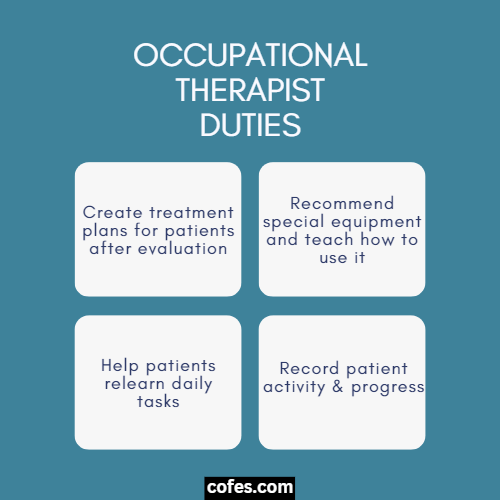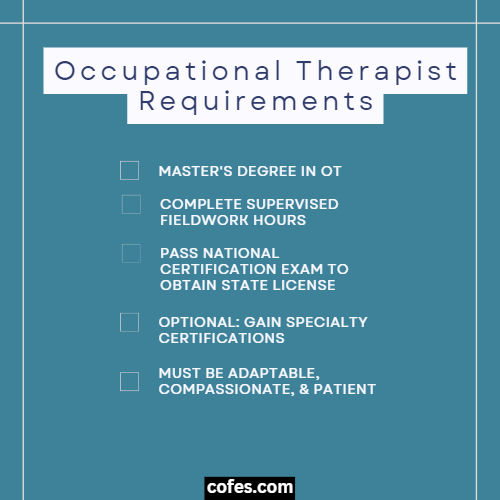While carrying out your daily activities, you may engage in harmful practices that negatively influence your health or well-being.
Occupational therapy is focused on helping you live your best life, doing everything you want to do in life in the healthiest possible way.
Occupational Therapist Information
| Official Job Title | Occupational Therapist |
| Average Salary | $95,560 |
| Stress Level | High |
| Work/ Life | High |
| Job Satisfaction | Average |
| Career Advancement | Average |
Occupational Therapist Job Description
Who Is an Occupational Therapist?
Occupational Therapists (OTs) are healthcare professionals that help people address issues that could be threatening to carry out their daily activities.
They help people perform daily activities in ways that would facilitate well-being.
Occupational Therapists are also crucial in rehabilitation, especially with people who have suffered accidents, physical illnesses (especially those linked with motion in the body), mental illnesses, and other rehabilitation procedures.
They help people who have recently undergone surgery fully recover and carry out daily activities with ease.
Responsibilities, Duties, and Roles of an Occupational Therapist
Below are some of the responsibilities of an OT:
- They help children living with disabilities to actively partake in school activities.
- They help disabled adults who are dealing with a disability to engage in sporting and recreational activities.
- They help people create routines to make the home, school, or workspace safe.
- They help disadvantaged people stay self-sufficient by teaching them how to use assistive technology.
- They assist in the treatment and rehabilitation of cognitive impairment in people.
- They help people recovering from a brain injury, stroke, Alzheimer’s disease, schizophrenia, and more.
The responsibilities of an OT aren’t limited to any age group.
They help infants, adolescents, and adults.

What Does an Occupational Therapist Do on a Daily Basis?
Although different patients have different daily requirements from the OT, some of the general day-to-day activities of an Occupational Therapist include:
- Reviewing patients’ medical files and evaluating progress
- Examining patients’ homes and workspaces to determine needed improvements.
- Educating caregivers and family members of patients on how to appropriately accommodate the recuperating patient
- Guiding patients through tasks that will quicken development
- Suggesting assistive technology and teaching the patients how to properly used them.
Occupational Therapist Salary
According to Salary.com,
Average Salary
The Average Salary of an Occupational Therapist is around $95,560.
Starting Salary
The starting salary for lower levels is usually around $80,230.
Senior Salary
And the senior salary is usually around $111,000.
How To Become A Occupational Therapist
The Entry Level: Certification, Training & Degree
According to The University of St. Augustine for Health Sciences, you would need to earn a Bachelor’s degree in a related field such as psychology, health science, or biology.
After this, you would need to earn a Master’s or Doctorate, where you would simultaneously write the licensure exams after practicing in the field (as part of your academic requirements).
After getting these certificates, then it is time to get certified.
The National Board of Certification of Occupational Therapy (NBCOT) will examine you in order to pass you fit to practice in the United States.
However, that’s not all.
After gaining a license from the Federal Level, you may need to get a license from your state due to varying requirements.
Other Skill Sets, Requirements & Qualifications
After getting a degree, the necessary certifications, and licenses, it is essential that you kick off your career with a specialization to make you employable.
For example, you could take further courses in mental health, physical rehabilitation, or gerontology, which are all branches of Occupational Therapy.
As an OT, you must be:
- An excellent communicator
- Empathic
- Extremely patient
- Persistent
How Long Does It Take to Become an Occupational Therapist?
After getting a Bachelor’s degree in an appropriate field, it takes a maximum of three years and 90 days to get a graduate degree as an OT and a License.
Is It Hard to Become an Occupational Therapist?
Becoming an OT is quite straightforward, but it takes hard work.
All you need do is study, pass your exams, and get a license.
Occupational Therapist Career Paths
The Occupational Therapist Roadmap
The roadmap of an Occupational Therapist is simple.
Bachelor’s degree >>> Master’s or doctorate >>> Obtain Federal and State Licenses >>> Specialize >>> Practice.
Projections For Growth in Occupational Therapy Jobs
According to the U.S. Bureau Of Labor Statistics, Occupational Therapy as a job is expected to grow by about 14% within the next decade.
Occupational Therapists can also move up the career ladder with a few exciting options.
They can grow to become senior Occupational Therapists, Certified Hand therapists, or Regional Rehabilitation Directors.
In Summary: Is Occupational Therapy A Good Career?
Yes, Occupational Therapy is one of the best careers in health.
Monetary job satisfaction and moral satisfaction are part of this role since you are helping others live healthier.
In addition, it offers room for specialization in several sub-categories, such as pediatric OT, and mental health OT.
This growth means that OTs will be paid higher in the coming years.
Working Conditions
Can an Occupational Therapist Work Remotely from Home?
Typically, an occupational therapist needs to have regular contact with the patients for proper evaluation.
Hence, they never work from home; they either work at the hospital or administer treatment at the patient’s home.
However, an Occupational Therapist can work as a Telemedicine Physician, creating video content to guide people in need of specific medical services; this is done remotely.
There are a few other non-clinical OT jobs that do allow remote work.
But, generally, most Occupational Therapists do not work remotely.
How Many Hours Does an Occupational Therapist Work?
Occupational therapists actively work for about 40 hours a week.
Of course, it could be more, but generally, it’s 40 hours, like every other 9-5 job.
Can an Occupational Therapist Work Part-Time?
Yes, OTs can work part-time.
What Are the Average Vacation Days of an Occupational Therapist?
For the purpose of patient satisfaction, OTs may work on weekends and even outside working hours.
However, the general annual vacation period is about three weeks.

Alternative Careers & Similar Jobs to an Occupational Therapist
- Medical Laboratory Technician
- Prosthetist
- Medical Records Technician
- Medical And Health Service Manager
- Veterinary Assistant
- Mental Health Counselor
- Pharmacy Assistant
- Research Assistant
- Dietitian
- Food Scientist
- Medical Researcher
- Chemical Dependency Counselor Assistant
- Case Manager
- Physical Therapy Assistant
Occupational Therapist Resume Tips
As an Occupational Therapist, your skills and experience are the most critical factors for any employer to consider you.
Hence, you must write a resume that shows how you have put your communication skills, empathy, and patience to good use.
Here are some tips:
- Outline your experiences anti-chronologically from the most recent to the oldest.
- Focus more on your strengths and what you can offer, even outside your work experience.
- Use the necessary keywords to ensure you pass through the Applicant Tracking System (ATS) software.
- Give detailed information about your responsibilities at your old employers or even your internships (if you have never had a real job)
- Most Occupational Therapists have the same basic certifications, but if you have studied further to earn more awards, you should highlight them alongside the general ones in your resume.
Occupational Therapist Interview Questions
What inspired your career as an OT?
Why it works: It helps the recruiter determine your passion for the job and hence your commitment.
What qualities do you think can make you stand out among other OTs
Why it works: It helps to identify your skills and if you can really make a positive difference with your approach.
What are your strengths and weaknesses?
Why it works: It helps to judge your honesty and openness to improvement.
How do you stay on the developing trends in OT and health generally?
Why it works: It helps to identify how well you are open to advancements (flexibility).
Have you ever faced a difficult patient? How did you handle the situation?
Why it works: It helps to understand your tolerance level and how well you can overcome challenges.
Jobs Related To Occupational Therapy
According to study.com, the most closely related careers to OT in the United States are as follows:
- Recreational Therapy
- Physical Therapy
- Occupational Therapy Assistants
For HR Managers: Tips for Hiring an Occupational Therapist
Key Characteristics to Look for In an Occupational Therapist
When hiring an Occupational Therapist, one of the most crucial requirements is to get an excellent communicator.
Communication isn’t linked to talking; signaling and body language are imperative.
They may need to work with toddlers or adults with cognitive impairment, and if they cannot communicate properly, they will fail at their jobs.
Therefore, a successful OT must be dynamic in communication.
It is also vital to ensure that the employee is caring.
They often have to deal with disabled or incapacitated people, and the scope of work requires them to nurture these patients as though they are children.
Lastly, an OT must be well organized.
They deal with patients who may not have a good memory of what is going on.
Therefore, they must keep all records safe and not mix up anything, as this could be detrimental to lives.
Other essential attributes like patience, empathy, and persistence have been listed above.
Minimum Level of Education and Experience
A master’s degree is the minimum requirement for an OT.
However, a Doctorate may be more appropriate for some more specialized job requirements.
